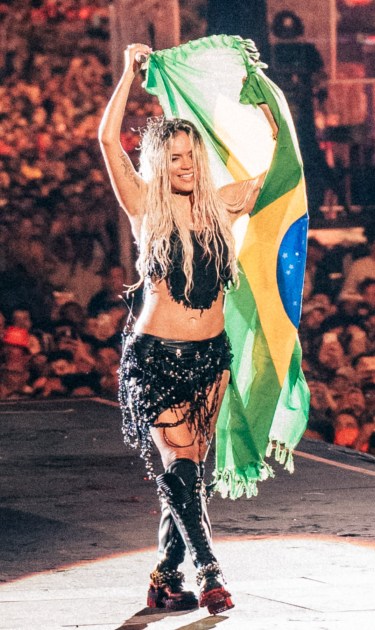On the morning of Sept. 20, Katy Perry’s team would wake up to a deluge of negative reviews. The press rollout for her new album, 143, had quickly gone sideways. The zero-calorie feminism of her lead single “Woman’s World,” produced by the controversy-ridden Lukasz “Dr. Luke” Gottwald, had been lambasted on social media for weeks. At the time of the album’s release, critics panned the record as an uninspired facsimile, modeled in the shape of her 2010 breakthrough, Teenage Dream.
Yet by nightfall in Rio de Janeiro, Perry took the stage at the Olympic Park, marveling at the sight of over 100,000 people cheering her on. In spite of her naysayers in the States, Perry earned the coveted slot as the Friday night headliner at this year’s Rock in Rio, locally billed as the “South American Super Bowl” of music festivals. U.S. acts like Travis Scott, Avenged Sevenfold, and Shawn Mendes also made appearances. Perry chose the Rock in Rio’s 40th anniversary to debut her newest songs live for her Brazilian fans, who she has described as “the most passionate, [and] the best.”
“I grew up with Katy Perry,” says Dani, a Brazilian fan who felt especially moved by Perry’s support for the LGBTQ community. This was her first time seeing the pop star in action. “I’m very grateful that she loves her fans from Brazil… Brazilians are loyal. We will wait a long time to see our favorite artists.”
Rock in Rio, which preceded festivals like Coachella and Lollapalooza, has long provided a platform for artists from other countries to build rapport with local fans. Brazil, the most populous nation in Latin America, has emerged as a power player in the global music market in recent years. The country is the ninth most competitive market in the world and the largest domestic one in Latin America. The night before Perry’s momentous set, Will Smith unveiled plans to record new music during his appearance at the festival’s Sunset Stage. African superstars Tyla and Davido performed as well, and linked up with Beninese diva Angélique Kidjo during her multi-night residency at Rock in Rio’s Global Village.

“We want artists to use Rock in Rio, not only as a stop on their tours, but to connect with a new audience in one of the world’s biggest markets,” Luis Justo, CEO of Rock in Rio, tells Remezcla. “Bruno Mars performed at our new festival in São Paulo last year, called The Town. After that [show], there was an explosion in his streaming numbers… a year later, he is returning to perform 15 stops in Brazil.”
In 2024, Rock in Rio sold out five of its seven nights and averaged between 95,000 and 100,000 attendees each night, amounting to 730,000 people from 62 different countries. In comparison, this year’s Coachella only counted between 80,148 and 81,690 ticket sales per weekend.
Although English-language artists made up the majority of headliners, Brazilian artists were well-represented at Rock in Rio this year. Organizers designated Saturday as “Brazil Day,” which featured a lineup exclusively made up of Brazilian acts. This marks a welcome shift for locals like Dr. Nicole Froio, a writer and researcher based in Rio, who grew up seeing acts like Elton John, Bruce Springsteen, and Beyoncé at the fest.

“The biggest draw for Brazilians is the opportunity to see artists that they wouldn’t usually get to see,” she says, “but I do think that the focus on international artists can overshadow what’s going on in the local Brazilian scene. Artists from abroad are paid millions to come, but [there remains] a massive gap in pay and support for Brazilian artists, like local samba bands, that make the city what it is.”
Saturday’s crowds rallied around the sounds of samba and sertanejo, a folky regional sound with roots in the Brazilian countryside. High-charting ballads by the 20-year-old rising star Ana Castela, as well as genre matriarch Simone Mendes, stoked the crowd into heartfelt singalongs. Other homegrown stars, like R&B singer Iza and MC Karol Conká, enjoyed much fanfare.
Brazilians are loyal. We will wait a long time to see our favorite artists.
After cutting her teeth playing a smaller stage at Rock in Rio two years ago, the funk-pagode queen Ludmilla, since endorsed by Beyoncé, had been upgraded to a Friday night set on the main stage, known as the Palco Mundo. “When Ludmilla performed, it added legitimacy to her career,” says Froio. “Rock In Rio didn’t [initially] accept Brazilian funk as a part of the festival, but I think that changed when Anitta started being a part of the lineup.”

Anitta’s transition from local funk singer to crossover superstar has rendered her an industry power player in Brazil and beyond. Yet despite years of campaigning by the multilingual hitmaker behind 2022’s massive “Envolver” — and seven neighboring Spanish-speaking countries — public interest in Spanish-language music remains low in Brazil. (Bad Bunny has skipped the country entirely during his South American tours).
Yet thousands of fans still journeyed from the U.S., Mexico, and Colombia to see the “Bichota” hitmaker Karol G, whose dynamite, rock-infused set was wedged between those of Cyndi Lauper and Perry. Her Mañana Será Bonito Tour had included a stop in São Paolo earlier this spring. “This show is a triumph for Karol and for Latinas,” says reality TV star and Drag Race Brasil judge Raphael Dumaresq. “People here don’t appreciate music in Spanish. So the fact that she’s on this stage is saying something!”
Even if her Portuguese language skills are minimal, Karol wisely tapped into Brazil’s large LGBTQ community, itself a huge arbiter of any pop diva’s success in the country, by calling the São Luís-born drag icon Pabllo Vittar to the stage. Together, they joined Iranian artist Sevdaliza and French singer-songwriter Yseult in the first-ever live performance of their breakout reggaeton-funk hit, “Alibi.” The song, which interpolates lines from the Magín Díaz version of the song “Rosa, Qué Linda Eres,” was sung in English, French, Portuguese, and Spanish. Judging by the joyous reception from the audience, the scene was a harbinger for a blended, global sound that’s just starting to bubble up; it’s only fitting that it came together in Rio.

“Brazil is a diverse country, and I think that what we can show to the world is that it’s possible to live your differences and stay connected,” says Justo. And, if the data is any proof, any artist looking to build an international presence and join forces with the best and baddest talents the world has to offer… would be wise not to discount Latin America’s most powerful musical community. It’s time that artists and listeners alike heed the calls from fans, and — as the famous social media saying goes — come to Brazil.
Travel and accommodations were provided to the author by The Zeitgeist Agency for the purpose of writing this story.
